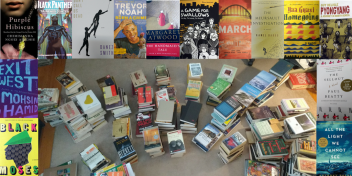Teachers don’t have enough time in any given day to do all the planning and grading and million other things that are heaped on us. We don’t have time or energy to waste. But we do it. I see it every day. At its worst, I see instruction intentionally planned to create an environment of compliance. Reading compliance. We waste far too much energy trying to ensure something that is impossible to do: make sure students read all the words.
As an English teacher, I desperately want my students to love reading like I do. I want them to understand the power of words. I want them to know books are better than the movies based on them. I want books to have the same power over them that they have over me. But if my focus is for them to read all the words, I won’t have accomplished any of these things with my students. And I’ll be wasting a lot of energy that could be used elsewhere.
I graduated high school. I was an English major from day one as an undergrad. I earned a Master’s in Literature. I’m a huge reader. You can see what I’ve been reading this year  here. I’m a book nerd. I recently read Derek Walcott’s postmodern epic poem Omeros and a companion book of essays called The Epic of the Dispossessed. No one assigned them to me. I wanted to read them. For fun. That’s the type of reading nerd I am. I savored every page of Walcott’s poetic magic and every insight of the accompanying essays. But throughout my academic career, it’s always been different. You want to know who didn’t read all the words? Me. At any educational institution I’ve ever attended, I’ve never read all the assigned pages. I didn’t read all the words assigned to me in high school. Or college. Or grad school. At each stage of my life—and in each academic program—my reasons for not reading all the words changed, but one thing remained constant: I did not read all the words. And now, as a high school teacher, can I be so hypocritical as to point a finger at students who do the same?
here. I’m a book nerd. I recently read Derek Walcott’s postmodern epic poem Omeros and a companion book of essays called The Epic of the Dispossessed. No one assigned them to me. I wanted to read them. For fun. That’s the type of reading nerd I am. I savored every page of Walcott’s poetic magic and every insight of the accompanying essays. But throughout my academic career, it’s always been different. You want to know who didn’t read all the words? Me. At any educational institution I’ve ever attended, I’ve never read all the assigned pages. I didn’t read all the words assigned to me in high school. Or college. Or grad school. At each stage of my life—and in each academic program—my reasons for not reading all the words changed, but one thing remained constant: I did not read all the words. And now, as a high school teacher, can I be so hypocritical as to point a finger at students who do the same?
We put too much energy put into monitoring if students are reading all the words: reading logs, reading journals, or the worst of the lot, reading quizzes. Which of these creates life-long readers and which destroys them? From a very young age, students recognize the fact they are being asked to prove they read, and they resent us for it. And they resent books for it. What could be more sad than that?
We should encourage students to read what is assigned. We should expect it. We should demand it. I ask my students every day about their reading progress. I know when they are not reading. I talk to their coaches and club sponsors and counselors. I call home. But my classroom is no longer a place that tests whether or not they read. When I was a young teacher, my classroom functioned like this: I assigned a certain number of pages for homework, and then the following class period, I gave them a reading quiz comprised of 10 or so questions. If they got them all correct, it surely proved to me that they read all the pages. If they get them wrong, they failed the quiz, and more importantly…that showed ’em. They felt such shame at their zeros that they would be sure to read next time. Over time some curious patterns arose. My “good readers” didn’t always ace the quizzes. My “bad readers” weren’t motivated to become good readers. It didn’t take long for me to be the one to feel the shame. I realized that motivated students might not be reading for the questions I was asking on the quizzes, and then were discouraged because they actually were doing the reading. I realized that students who weren’t motivated to read also weren’t motivated by grades. I realized that reading quizzes were precious minutes of class time that could have been spent better. I realized I was imposing the same bad instructional practices that were imposed on me as a student—those same practices that never made me the student want to read all the words. To students who loved reading, or even liked it enough to complete their assignments for class, I was changing the way they were reading—for the worse. I was making them surface-level plot readers. Instead of inspiring their love of reading, I was pointing out all the worst things about reading. For students who didn’t think they were good at reading or couldn’t read quickly enough to meet the deadline, their zeros were self-fulfilling prophecies. Those students were right. They weren’t good at reading—or at school for that matter—so what was the point of trying next time?
comprised of 10 or so questions. If they got them all correct, it surely proved to me that they read all the pages. If they get them wrong, they failed the quiz, and more importantly…that showed ’em. They felt such shame at their zeros that they would be sure to read next time. Over time some curious patterns arose. My “good readers” didn’t always ace the quizzes. My “bad readers” weren’t motivated to become good readers. It didn’t take long for me to be the one to feel the shame. I realized that motivated students might not be reading for the questions I was asking on the quizzes, and then were discouraged because they actually were doing the reading. I realized that students who weren’t motivated to read also weren’t motivated by grades. I realized that reading quizzes were precious minutes of class time that could have been spent better. I realized I was imposing the same bad instructional practices that were imposed on me as a student—those same practices that never made me the student want to read all the words. To students who loved reading, or even liked it enough to complete their assignments for class, I was changing the way they were reading—for the worse. I was making them surface-level plot readers. Instead of inspiring their love of reading, I was pointing out all the worst things about reading. For students who didn’t think they were good at reading or couldn’t read quickly enough to meet the deadline, their zeros were self-fulfilling prophecies. Those students were right. They weren’t good at reading—or at school for that matter—so what was the point of trying next time?
One problem with traditional reading quizzes is that their qualitative data metrics are terrible . We want to believe we ask all the right questions. But we don’t. If a student can’t remember the name of a character does that mean he didn’t read it? If a student can, does that mean she did? Of course not. Another problem is that a reading quiz doesn’t actually promote reading. We want to believe it does. We want to believe that it is a check to ensure kids are doing what they’re supposed to. At best, reading quizzes ask students to be surface readers; at worst they create students who only read to get a grade, or something only slightly worse than that: students who ask a friend in an earlier period for the answers to the quiz. So how do we fix this?
. We want to believe we ask all the right questions. But we don’t. If a student can’t remember the name of a character does that mean he didn’t read it? If a student can, does that mean she did? Of course not. Another problem is that a reading quiz doesn’t actually promote reading. We want to believe it does. We want to believe that it is a check to ensure kids are doing what they’re supposed to. At best, reading quizzes ask students to be surface readers; at worst they create students who only read to get a grade, or something only slightly worse than that: students who ask a friend in an earlier period for the answers to the quiz. So how do we fix this?
We fix this issue by focusing merely on what matters. We live at the top of Bloom’s taxonomy rather than at the bottom. We live at levels 3 and 4 of Webb’s Depth of Knowledge instead of levels 1 and 2. We think about how we shift our planning to create this shift in assessment. We rethink our why. Our reasons for assigning a text are not so students read all the pages. Our reasons for assigning a text are not so that they understand what happens in the book. Our reasons for assigning a text are not so we can “teach the book.” We must stop teaching books. We must teach skills. An often taught book is The Catcher in Rye. I love Catcher and Holden and Phoebe and if my students love it too, that’s great, but is loving Catcher a life skill? Nope. Is knowing that Holden goes to Thompson Hill instead of going to the football game a life skill? Absolutely not.
When it comes down to it, I have simple goals for my students. I only want my kids to be able to do five things. Just five. I want them to be better thinkers, readers, writers, listeners, and speakers. That’s all. And yes, those five are huge. But none of them require students to read all the pages. If I focus more energy on helping them improve those five skills and less on if they compliantly read all of the pages, I’ll do them a much greater service. Instead of spending my time creating a 10-question quiz, one of which asks students where Holden goes during the football game, what if students came into the classroom and found that passage from Catcher on their desks. What if they had several minutes to read and annotate the passage. Then were asked one question (instead of 10), but the one asked them to analyze the motivations of a person who wants to avoid large social gatherings like a football game and demanded they cite evidence about this person (Holden) in particular, based on the passage. After some silent writing time, students shared their ideas, capturing interesting comments offered by their peers. Finally, students were given several minutes to revise their writing based on any new  illuminations. Regardless of whether they did none, some, or all of the reading at home, every student would wrangle with complex language, analyze text for meaning, engage in meaningful discourse, and write their own ideas about the text. A close reading forces those who didn’t read at home to do all the same heavy mental lifting as all other students, which is not required of them on a reading quiz. Additionally, in reading a passage, students who haven’t been reading might be intrigued and want to read more. And yes, I hear the chorus shouting: “Then why would any kid read at home?” For several reasons. And for reasons that we should openly discuss with our students. A close reading is not an excuse to not read. A close reading provides an opportunity to reread a specific passage, which deepens our understanding and helps us stretch more readily toward more complex levels of cognition. A close reading is merely one part of the reading, and the best written responses will naturally synthesize the given passage with other parts of the text.
illuminations. Regardless of whether they did none, some, or all of the reading at home, every student would wrangle with complex language, analyze text for meaning, engage in meaningful discourse, and write their own ideas about the text. A close reading forces those who didn’t read at home to do all the same heavy mental lifting as all other students, which is not required of them on a reading quiz. Additionally, in reading a passage, students who haven’t been reading might be intrigued and want to read more. And yes, I hear the chorus shouting: “Then why would any kid read at home?” For several reasons. And for reasons that we should openly discuss with our students. A close reading is not an excuse to not read. A close reading provides an opportunity to reread a specific passage, which deepens our understanding and helps us stretch more readily toward more complex levels of cognition. A close reading is merely one part of the reading, and the best written responses will naturally synthesize the given passage with other parts of the text.
The reality is, they don’t have to read all the words. I didn’t, so why do they? I’d like them to read all the words, but I can’t spend my energy trying to figure out if they did. I can’t construct my class as a place where I jump out from the shadows and shout, “Ah ha! I knew you only read 76% of your assignment last night! And I’ve constructed the perfect quiz that will ensure you earn a 76% on it!” I’ve done it. But it’s not worth doing. A classroom like that is antithetical to all the things I want for kids. We too often negatively impact students by the assignments associated with the reading even though we have the opposite intentions. If I want them to love reading, why would I make them hate reading?
Instead I can use my energy to create meaningful learning experiences for students. I can make them think critically and engage with other people’s perspectives and develop original claims and cite evidence and engage their brains in the type of cognition that will pay dividends for their entire lives. I want young people to love literature and value reading and be impacted in the ways I was when I first read a given text, but guess what? They aren’t me. Or maybe, considering my history as a reader when I was a student, they are.

You would love what I’m seeing in inquiry-based algebra as the students are learning to analyze text, having to read the paragraphs several times to “get it.” They don’t mind because the ah-ha’s are so powerful.
LikeLiked by 1 person
I’m really interested to know what you’re seeing–do you have a blog post about it (I was persuing your blog but didn’t find anything specifically related to this)? Maybe you could write one if you haven’t yet. I’m definitely interested in literacy in other content areas, too. I recently suggested to my math colleague that he have his students write a letter to math, or to a particular math problem. He said the results were astounding and that he learned so much about the kids and how to best support their learning! Thanks so much for reading!
LikeLiked by 2 people
Pingback: My Year as a Student – mrgillblog